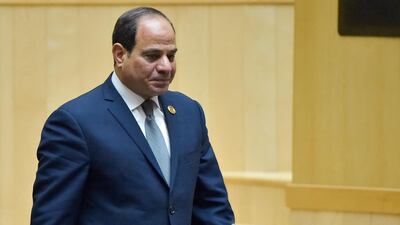Egypt’s parliament on Wednesday began debating constitutional amendments that could potentially see general-turned-president Abdel Fattah El Sisi in power until 2034, grant him wider powers and enshrine the military as the nation’s supreme guardian.
Adopting the changes by the 596-seat chamber, which is packed by Sisi supporters, is virtually a foregone conclusion.
A vote is expected on Wednesday or Thursday after which the amendments will go to the house’s constitutional and legislative committee, which will have 60 days to debate and hold hearings on the changes before returning them to the house plenary for a final vote.
A national referendum on the amendments, as required by the 2014 constitution, will follow, most likely before the start in early May of the Muslim fasting month of Ramadan.
The amendments will almost certainly be endorsed in the referendum, but a low turnout would cast a shadow on the legitimacy of the changes, something that authorities would mobilise the state’s resources to avoid.
Ali Abdel-Al, the parliament speaker and a staunch supporter of the president, pledged to lawmakers on Wednesday to conduct a “far reaching and civil societal debate” on the changes, saying all segments of the population would freely air their views and be heard.
“In moving ahead with the process of changing the constitution, the House of Representatives is motivated by patriotism and with consideration only for the nation’s supreme interests,” said Mr Abdel-Al, who has a track record of harshly reacting to any criticism of the president’s policies.
In a separate development, Egypt’s chief prosecutor on Wednesday issued a gag order on a case involving two little-known actresses and a lawmaker who has declared his opposition to the amendments. The prosecutor, Nabil Sadeq, also ordered the Ministry of Communications to block any Internet site that posts “immoral” photos or videos.
The case, which has been dominating social media in Egypt, is rooted in several lewd videos allegedly involving lawmaker Khaled Youssef, a one-time Sisi supporter and a movie director. But interest has focused on a widely shared clip purporting to show the two women belly dancing while wearing only underwear for his entertainment.
The two women, who claim to have been secretly married to Mr Youssef at the time the video was filmed, were arrested last week and face charges of debauchery and inciting moral corruption.
Mr Youssef does not appear in the video, but he is heard addressing the women in a voice that resembles his. Currently visiting family in Paris, he says the videos have only resurfaced to punish him for opposing the amendments. He has pledged to return home to clear his name.
“I know that continuing to state my opposition to amending the constitution will bring me problems that may take me to prison on fabricated charges,” he posted on Facebook on February 4.
Proponents of the constitutional amendments say they are needed to allow Mr Sisi, who led the military’s 2013 ouster of a divisive Islamist president, to complete his ambitious drive to revive the economy, overhaul infrastructure and defeat Islamic militants. Critics, however, see them as a throwback to authoritarian rule and warn they could undermine the country’s political stability.
Ziad Bahaa-eldeen, who served as deputy prime minister following the 2013 ouster of Islamist president Mohammed Morsi, said that, in principle, amending the constitution was legitimate, but took issue with doing so at a time when the government, he added, was suppressing freedoms and stifling dissent.
“The train of constitutional amendments has left the station but what I fear the most is that the focus is exclusively on reaching the final destination, both quickly and efficiently while ignoring the genuine response, legitimate questions and concerns by Egyptians that don’t find their way to the official media and the state-owned TV stations,” he wrote Monday in the independent Al-Shorouk newspaper.
The proposed changes extend presidential terms from four to six years and maintain a two-term cap on any president, but they also include a one-off clause that allows Mr Sisi to run for a third and fourth, six-year terms after his current term ends in 2022.
They also empower him to appoint top judges, eliminate the judiciary’s role in vetting draft legislation before they become law and create a new body led by the president that effectively runs the judiciary.
Other amendments include creating the position of at least one vice president, restoring an upper chamber and giving women a 25 per cent quota in the next house as well as “suitable” representation for minority Christians, expatriates and people with special needs.


